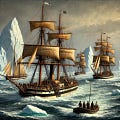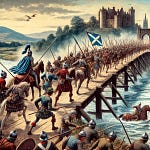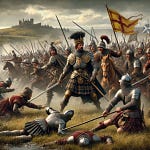Welcome back to "This Day in Scottish History." I'm your host, Colin MacDonald. Today, we delve into a fascinating chapter of Scottish exploration—an event that took place on September 6, 1892. On this day, four steam-powered whaling ships set sail from Dundee, marking the beginning of the Dundee Whaling Expedition to Antarctica. This bold venture was not just about hunting whales but also marked a significant step in polar exploration during an era when much of Antarctica remained a mysterious and uncharted wilderness.
The late 19th century saw a decline in Arctic whaling, primarily due to overfishing. In response, Dundee merchants equipped a fleet to venture further south in search of new hunting grounds, specifically targeting the elusive right whales of the Weddell Sea. This was a significant departure from traditional Arctic routes, as Antarctic whaling was largely unexplored and predominantly shore-based. On September 6, 1892, the Balaena, Active, Diana, and Polar Star set sail on this ambitious expedition, headed into the unknown waters of the Southern Ocean.
The expedition included notable figures such as William Speirs Bruce, a pioneering polar scientist, and William Gordon Burn Murdoch, a surgeon and artist who documented the voyage aboard the Balaena under Captain Alexander Fairweather. Despite their hopes, the expedition faced unexpected challenges. The blue whales, abundant in Antarctic waters, were far too powerful for their equipment and could not be captured. Nevertheless, the fleet managed to secure a profit by harvesting a significant number of seal pelts.
One of the expedition's most significant achievements came on January 8, 1893, when Captain Thomas Robertson of the Active discovered Dundee Island. At that time, Antarctica was still largely an uncharted frontier. The dangers of exploring such a remote and treacherous environment, characterized by rough seas and fierce weather conditions, meant that very few had even glimpsed the frozen continent.
While the primary objective was commercial, the Dundee Whaling Expedition inadvertently contributed to early Antarctic exploration. The expedition provided valuable experience and set a precedent for future voyages, including the British National Antarctic Expedition of 1901, also known as the Discovery Expedition. This expedition, led by Captain Robert Falcon Scott and featuring notable explorers such as Ernest Shackleton and Edward Wilson, aimed to carry out scientific research rather than solely pursue territorial claims or hunting.
The Discovery, constructed at Dundee’s Victoria Dock, was a robust vessel built specifically for polar conditions, combining traditional wooden shipbuilding techniques with new scientific requirements. The ship had unique features designed to withstand the crushing pressures of the ice, such as iron-shod bows for ramming ice and a retractable rudder and propeller. Its design reflected the city’s deep maritime heritage and expertise in constructing whaling ships capable of surviving harsh conditions.
As the Discovery Expedition demonstrated, exploration was about more than just reaching new geographical frontiers; it was also about expanding the frontiers of knowledge. The expedition conducted extensive magnetic surveys and collected invaluable meteorological, oceanographic, geological, and biological data. The scientists on board made groundbreaking discoveries, including over 500 new marine species and the first documented observation of an Emperor Penguin rookery.
The legacy of these Scottish-led expeditions to Antarctica is profound. They not only advanced scientific understanding of the region but also paved the way for future explorations that would continue well into the 20th century. The spirit of adventure and discovery that drove these expeditions remains a testament to the enduring human quest to explore the unknown.
As we reflect on the events of September 6, 1892, we celebrate the courage and determination of those who embarked on the Dundee Whaling Expedition. Their efforts laid the groundwork for future explorations and scientific advancements, demonstrating the pivotal role Scotland has played in the history of polar exploration.
Thank you for joining us on this journey through history. Tune in tomorrow for another enlightening episode of "This Day in Scottish History." I'm Colin MacDonald, Haste Ye Back!













September 6, 1892 - The Dundee Whaling Expedition